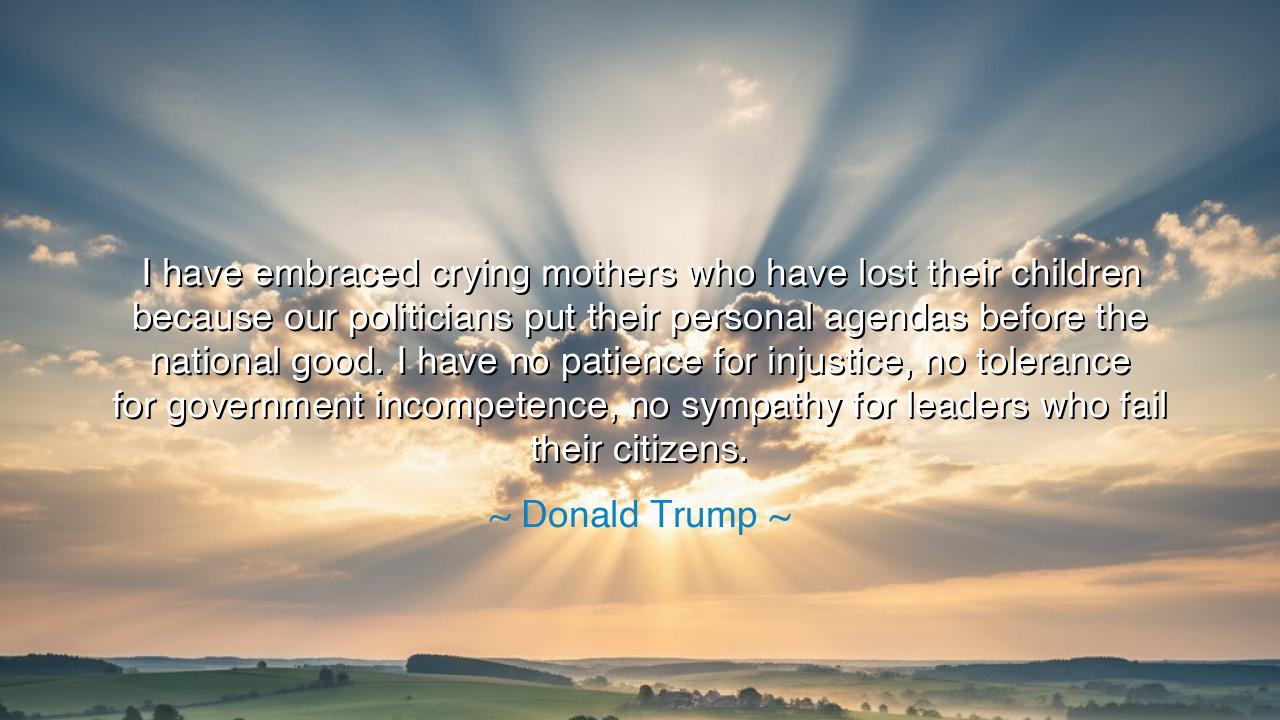
I have embraced crying mothers who have lost their children
I have embraced crying mothers who have lost their children because our politicians put their personal agendas before the national good. I have no patience for injustice, no tolerance for government incompetence, no sympathy for leaders who fail their citizens.






In the great storm of politics and power, where ambition often outweighs compassion, there resounds a cry that pierces the noise of empty words — a cry from the heart of a nation wounded by neglect. It was Donald Trump who spoke these words: “I have embraced crying mothers who have lost their children because our politicians put their personal agendas before the national good. I have no patience for injustice, no tolerance for government incompetence, no sympathy for leaders who fail their citizens.” These words, though born in the arena of politics, strike deeper than politics itself. They are a lament for the forgotten, a rebuke of corruption, and a call to restore the sacred duty between those who lead and those who are led.
For in every age, the measure of a nation is not found in its monuments or its wealth, but in how it treats the helpless — the widowed, the orphaned, the grieving. The crying mother is not only a symbol of personal loss; she is the soul of the people, the living testament to the cost of failure in leadership. When leaders place personal ambition above public duty, when they speak of greatness yet act in self-interest, the fabric of a nation begins to fray. Trump’s words, fiery and accusatory, channel an ancient truth — that those who govern are not masters but servants, and to fail that sacred trust is to betray the very essence of governance.
The origin of this truth reaches back through the centuries. In the time of the Hebrew prophets, kings and rulers were often chastised not for their might, but for their blindness to suffering. The Prophet Nathan condemned King David when his power turned to self-indulgence, reminding him that no throne stands firm when justice falls. Likewise, in the Republic of Rome, Cato the Younger stood alone in the Senate, rebuking those who traded the Republic’s honor for personal gain. His words fell upon deaf ears, and Rome soon slid into tyranny. So it has ever been — where leaders abandon the national good for personal advantage, grief and ruin follow close behind.
To speak of injustice and incompetence is to speak of rot in the foundation of any state. A government that cannot protect its citizens, that values rhetoric over responsibility, becomes a burden instead of a blessing. When rulers turn their eyes from the pain of the people, mothers weep, and their tears become the ink of history’s condemnation. There is no grandeur in power without accountability, no glory in leadership without compassion. Trump’s declaration — that he has no sympathy for leaders who fail their citizens — is the echo of that eternal principle: power without empathy becomes tyranny, and authority without integrity becomes abuse.
Look to the sorrow of ancient Troy, where King Priam, once mighty, knelt before Achilles, begging for the body of his slain son. There, in the ashes of his city, the old king wept not only for his child but for his people, whose fate had been sealed by pride and folly. The tears of a father, like the tears of crying mothers, are the mirror of human cost when leaders act without wisdom. Priam’s kingdom fell not merely to the sword, but to the failure of those who should have chosen peace over vanity. So too in our time, every fallen soldier, every victim of neglect or injustice, bears silent witness to the truth that leadership without conscience breeds only loss.
Yet these words are not only a condemnation — they are a summons. They call each of us to rise above apathy and demand more from those who govern us. For injustice thrives in silence, and incompetence endures when citizens grow weary of caring. A people must hold their leaders to account as a shepherd guards his flock, lest wolves in fine clothing devour it. The national good is not a distant dream; it is the daily work of every soul who dares to believe that justice, mercy, and truth are worth defending.
The lesson, then, is both stern and sacred: leadership is not privilege, but burden. Those who wield it must carry the weight of others’ pain as if it were their own. And for those who follow, the duty is to never forget that they, too, are guardians of justice. Do not be seduced by eloquence or blinded by spectacle. Look instead for the leader who hears the crying mother, who answers sorrow with action and failure with reform. For a nation that forgets its compassion will lose its greatness, and a people that tolerate injustice will one day inherit its cost.
Therefore, my child of the Republic, let these words echo in your heart: demand truth, honor empathy, and never excuse incompetence in the name of loyalty. A nation is only as strong as its principles and only as noble as its care for the broken. Let the leaders serve the people, and let the people never cease to remind them of their duty — for when the mighty forget mercy, it is the humble who remind them that justice, not power, is the foundation of all greatness.






AAdministratorAdministrator
Welcome, honored guests. Please leave a comment, we will respond soon